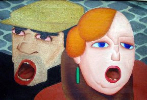[15] De Geusen, de Geusen
Nieu Kluchtigh Liedeken van den
Geusen Haes-op uyt Calloy
De Geusen, de Geusen
En die boose Fransen, boose Fransen,
Sy quamen met veel schepen aen
Om in Calloy te dansen.
Hebbense dat ghedaen? Doense, doense,
Hebbense dat ghedaen? Geus neef comt aen.
Graaf Willem, Graaf Willem,
Die vont een Maesgat open, Maesgat open,
Maer hy is gelijck eenen dief
Soo stil daer in ghekropen.
Hebbense dat ghedaen, enz.
De Marie, de Marie
En de Peirel schranse, Peirel schranse,
Sy nooden Graef Willem oock te gast
Om daer te comen dansen.
Hebbense dat ghedaen, enz.
Dat groot Bancket, dat groot bancket
Heeft hun moeten lucken, moeten lucken,
Maer doen den dans was uyt-ghedanst,
De keersen moeten sy snutten.
Hebbense dat ghedaen, enz.
Graef Willem, Graef Willem
Was op den wech ons komen, ons komen,
Maer hy passeerden eenen dijck
Daer verloor hy sijnen sone.
Hebbense dat ghedaen, enz.
De Peirel, de Peirel,
Sy had van hem vernomen, hem vernomen,
Met bommen ende grof gheschut
Hieten sy hem wille comen.
Hebbense dat ghedaen, enz.
Syn keucken schip, syn keucken schip,
Dat isser oock ghebleven, oock ghebleven,
En dry-en-tachentigh schepen daer by
Van de schoonste uyt-ghelesen.
Hebbense dat ghedaen, enz.
Met schande, met schande
Moest hy Calloy verlaten, Calloy verlaten,
Maer hy was vervaert van het gheschiet
En die vierighe granaten.
Hebbense dat ghedaen, enz.
Syn volck, syn volck,
Dat heeft hy al verlaten, al verlaten,
Hy nam sijn vlucht den Doel-waert in
En hoe moeten die Geusen praten.
Hebbense dat ghedaen, enz.
Met oorlof, met oorlof,
Bidt Godt tot allen tijden, t'allen tijden,
Als dat hy ons met vromicheyde
Van de ketters wilt bevrijden.
Hebbense dat ghedaen, enz.
| [15] De Geusen, de Geusen (The Beggars, the Beggars, 1638)
After they captured the city of Breda, the Dutch aimed for Antwerp, together with their French allies. In 1638 the Dutch approached the city from the North, the French from the South. The Dutch conquered some Spanish fortifications along the river Scheldt. But the Cardinal-Infante sent troops to stop them, and in a heavy battle near the fortified village of Kallo he succeeded in defeating the Dutch army. Thousands of Dutch soldiers were killed or made prisoners. The Dutch commander, Count William of Nassau, lost his son. About the same time, the French were defeated by other Spanish troops near St. Omer, at the French border.
This double victory for Ferdinand was celebrated in Antwerp with great joy, and Rubens was commissioned to design a triumphal car. The car took the form of a ship (fig. 2). The mast is transformed into an extravagant military trophy. The horses are driven by Providence. Behind her we see the Maids of Antwerp and St. Omer kneeling; in the middle beside the mast two winged victories, and on the raised platform aft the goddesses Virtue and Fortune; sitting beside the trophy Dutch and French prisoners. The triumphal car of Kallo was meant to be used in the annual procession, the Antwerp Ommegang, together with the Giant, the Elephant, the Whale, Mount Parnassus, and so on, as can be seen in a painting by Alexander Casteels in the background, right from the middle.
Another work of art commemorating Ferdinand's victory was the altarpiece Theodoor van Thulden designed for the church of Kallo. It shows the kneeling Ferdinand, receiving his sword from St. Paul. The image was engraved by Cornelis II Galle.
In addition, a popular song was written in honour of the victory of Kallo, or rather to the dishonour of the Dutch attackers, called Geusen Haes-op uyt Calloy (Beggars' Hasty Retreat out of Kallo). 'Haes-op' is also a pun on of one of the fortifications north of Antwerp, called Haesop.
New Comic Song about the
Beggars' Hasty Retreat out of Kallo
The Beggars, the Beggars,
And those beastly Frenchmen, beastly Frenchmen,
They came with lots of ships in tow
They came to dance in Kallo.
And is that what they did? Do it, do it,
And is that what they did? Hey, bring it on.
Count William, Count William,
He found a way right by it, way right by it
Right through Maasgat, (*1) just like a thief,
The way he snuck in quiet.
And is that what they did? etc.
The Marie, the Marie,
And the Peirel bulwarks, Peirel bulwarks,
Invited Count William as their guest
To do some fancy footwork.
And is that what they did? etc.
That party-time, that party-time,
They thought they had it handled, had it handled,
But when they'd danced the night away
They had to snuff the candles.
And is that what they did? etc.
Count William, Count William
Was on the way to get us, way to get us,
But he went past a certain dike,
And his son there kicked the bucket.
And is that what they did? etc.
The Peirel, the Peirel,
Were all prepared to meet him, to meet him,
With bombs and with artillery
They showed just how to greet him.
And is that what they did? etc.
His galley ship, his galley ship
They had to leave behind them, leave behind them,
And eighty-three more ships besides,
The best that you could find them.
And is that what they did? etc.
All shameful, all shameful
His forces must retire, must retire,
For in Calloy he was scared of the shot
And the grenades that were on fire.
And is that what they did? etc.
His soldiers, his soldiers,
He left them and went slinking, and went slinking,
He ran away in haste to Doel,
What will all the Beggars be thinking?
And is that what they did? etc.
So lastly, so lastly
Pray God now without ceasing, &c.
That he continue powerfully
From the heretics to free us.
And is that what they did? etc.
(*1): a small island in the Scheldt and mud flats over which the Dutch had to walk for hours.
Song translations by Ruth van Baak Griffioen.
|

